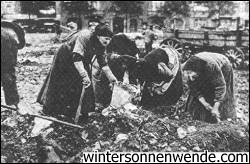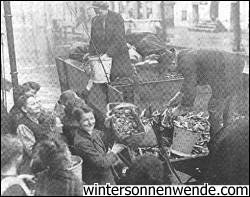|
Hidden Historical
Fact:
The Allied Attempt to Starve Germany in 1919
Article from The Barnes Review, April 1996, pp. 11-14.
If one word could describe Germany during the immediate aftermath of World War I, it would be "starvation." And yet, while some 900,000 German men, women and children were starving to death, the American and British public knew nothing about the reason for this holocaust, deliberately caused by the continuation of a wartime British naval blockade. Britain's post-war naval blockade of food to Germany in 1919 matched the then current blockade of news by the American and British press. Even today, only a few non-Germans know the truth, and American and British historians, for the most part, have participated in the coverup of this most appalling crime. The guilt of the world press in covering up the atrocity is compounded by the fact that the American and British public were told of the starvation itself, but were kept ignorant of the criminal policies of the Allies which produced it. Newspapers carried stories of relief efforts to rescue the starving. The most famed of these efforts was directed by Herbert Hoover, later to become the 31st president. As told by Otto Friedrich in Before the Deluge: A Portrait of Berlin in the 1920s, John Maynard Keynes cited the testimony of an observer who accompanied Herbert Hoover's mission to help the starving:
Meanwhile, the armistice terms dictated by the Allies at Versailles would assure that Germany could not recover economically even to the point of providing a subsistence livelihood for the majority of its citizens. France was to get Alsace-Lorraine outright; she would occupy all German territory west of the Rhine for 15 years and she would take possession of the rich coal mines of the Saar district, which was to be governed by the League of Nations. Poland would get the important industrial region of Upper Silesia, most of Posen Province and West Prussia, thus establishing a "Polish Corridor" to the sea and cutting off East Prussia from the rest of Germany. Denmark and Belgium would slice off several border regions and the League of Nations would take charge of Germany's African colonies.
Immediately following the war, Germany was wracked with insurgencies, coups and counter-coups. The Bolsheviks attempted a takeover similar to the revolution in Russia. The Allies, meeting in Versailles, celebrated the unrest and destruction. And the people - particularly the American people - were kept in the dark about the continuing blockade. Communist agents, sent by the Bolshevik regime in the fledgling USSR, were fomenting revolutions throughout the prostrate country. As Gen. Leon Degrelle points out in his Hitler: Born at Versailles:
And then, Degrelle says what few historians will admit: "Although the war had ended, Germany was still under Allied blockade [editor's emphasis], which was ruthlessly enforced. The first state of Germany to benefit from a lifting of the blockade would be communist-controlled Bavaria."3 One must search diligently for historical references to the continued, devastating blockade. And when mention is found, it is usually just that - a mere mention. Diether Raff confirms the peace-time blockade in his A History of Germany - From the Medieval Empire to the Present:
The effectiveness of the blockade, initiated years before the entry of the United States into the war, and which led to the sinking of the Lusitania,5 has been well documented. "It was the blockade that finally drove the Central Powers to accept defeat," says Richard Hoveth in his study of the struggle on the high seas during World War 1.6 "At first mild in its application, the blockade's noose gradually tightened until, with the American entry, all restraint was cast aside. Increasingly deprived of the means to wage war, or even to feed her population, the violent response was insurrection; apathy and demoralization the mute consequence of dashed hopes and thin potato soup."7 Basil Liddell Hart is quoted by Hoveth to the effect that, revolution and internal unrest notwithstanding, the blockade was "clearly the decisive agency in the struggle."8
The Allies clearly intended to starve the German people to death, foreshadowing the Morgenthau Plan of the latter days of World War II - a plan that actually went into operation to starve and exterminate one third of the German population. After confiscating the German merchant navy, the Allies proceeded to confiscate German private property all over the world, contrary to all precedent from previous wars when private property had been held in escrow until the ratification of peace treaties, when it would revert to its legitimate owners. Degrelle writes: "The Allied powers reserve the right to keep or dispose of assets belonging to German citizens, including companies they control [Article 167 B]. This wholesale expropriation would take place without any compensation to the owners [Articles 121 and 279 B]."11 And, Germany remained responsible for the liabilities and loans on the assets that were taken from them. Profits, however, remained in the hands of the Allies. Thus, private German property and assets were confiscated in China (Articles 129 and 132), Thailand (Articles 135-137), Egypt (Article 148), Liberia (Articles 135-140) and in many other countries.12 Germany was also precluded from investing capital in any neighboring country and had to forfeit all rights "to whatever title it may possess in these countries."13 The Allies were given free access to the German marketplace without the slightest tariff while products made in Germany faced high foreign tariff barriers. Articles 264 to 267 established that Germany "undertakes to give the Allies and their associates the status of most favored nations for five years."14 Germany, of course, had no such equal status. Germany was experiencing near famine conditions. It was at this moment the Allies decided to confiscate a substantial part of what was left of Germany's livestock. The American representative at Versailles, Thomas Lamont, recorded the event with some indignation:
Food shortages were such that 60,000 Ruhr miners refused to work overtime unless they were paid, even in the form of butter. When it became obvious that Germany would not be able to deliver the coal ordered by the treaty, the Allies lowered the amount from 43 million tons to 20 million tons. Degrelle points out that the virtual confiscation of German coal production led to the deaths of German children for lack of fuel for heat. John Williams, in the epilogue of his story about the war on the home front, has this one sentence: "In Germany... still subject to the blockade, blank misery prevailed."16 In his biography of Woodrow Wilson, Arthur Walworth says that the British command in Germany reported that food shortages raised a specter of anarchy.
There is evidence that Wilson actually thought the European powers would accept his "14 Points" and feed starving Germans now that the war was over. But, of course, that was not the case as discovered by Wilson's humanitarian point man, Hoover. England's Lloyd George, meanwhile, thought that the starvation was being ameliorated. He favored - although quietly - feeding his ex-enemy.
The food blockade was not terminated until July 12, 1919. On May 7 of that year, Count von Brockdorf-Rantzau had indignantly referred to this fact in addressing the Versailles assembly. "The hundreds of thousands of noncombatants," the German chief delegate had stated, "who have perished since November 11, 1918, as a result of the blockade, were killed with cold deliberation, after our enemies had been assured of their complete victory."19 The murderous Allied blockade, which continued for eight months after the end of the war, was one reason why a German war veteran who decided to go into politics a decade later was able to revive the seared memory of a German nation which had suffered greatly and vault himself to absolute power. His name, of course, was Adolf Hitler.
 Notes:
1Friedrich, Otto,
Before the Deluge: A Portrait of Berlin in the 1920s. New York:
Harper & Row, 1972. ...back...
2Degrelle, Gen. Leon, Hitler: Born at
Versailles. Torrance, CA: Institute for Historical Review, 1987. P. 341.
...back...
3ibid. ...back...
4Raff, Diether, A History of
Germany - From the Medieval Empire to the Present. New York: St.
Martin's Press, 1988. (First English edition.) ...back...
5The Barnes Review
will detail the story of the Lusitania in next month's issue. ...back...
6Hoveth, Richard, The Great
War at
Sea 1914-1918. New York: Oxford University Press, 1983. ...back...
7ibid. ...back...
8ibid. ...back...
9Cavendish, Brigadier Peter, ed.
The Marshall Cavendish Illustrated Encyclopedia of World War I. vol.
8. New York: Young Corp., 1984. ...back...
10ibid. ...back...
11Degrelle, op.cit. (Note
2), p. 510. ...back...
12ibid. ...back...
13ibid. ...back...
14ibid. ...back...
15ibid., pp. 511-512. ...back...
16Williams, John, The Other
Battleground - The Home Front: Britain, France and Germany 1914-1918.
Chicago: Henry Regnery & Co., 1972. ...back...
17Walworth, Arthur, Woodrow
Wilson. Boston: Houghton Mifflin Co., 1965. ...back...
18ibid., p. 283. ...back...
19ibid. ...back...
 More from our Archive:
|







